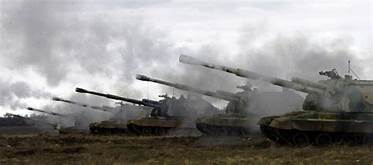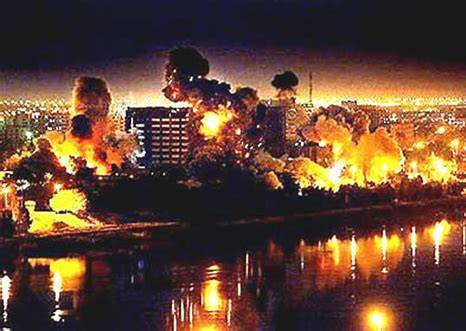Hypocrisy Abounds in Russia and U.S.
Kremlin and White House Decry Each Other’s Aggression
* * * * * * * * *
Biden Vows to ‘Defend NATO Countries’ (by What Authority?)
A WALL Commentary
|
The Russian Federation’s Constitution guarantees “freedom of ideas and speech” (Article 29) and “the right to assemble peacefully … hold rallies, meetings and demonstrations, marches and pickets” (Article 31). A correspondent reported on March 8, the 13th day of the Ukraine war, that police had arrested some 13,000 people in about 150 Russian cities for protesting the war. |
In March 2003, when the U.S. launched its second war on
Iraq, Russian President Vladimir Putin denounced it. The attack flouted
world opinion and international law, he said. In
bypassing the United Nations, America threatened
“collapse of the international security system.”
|
Iraq posed no danger to any neighbor or any other country, Putin said. Noting signs of Iraqi cooperation with arms inspectors, he questioned the claim that Iraq possessed “weapons of mass destruction.”
President George W. Bush perpetrated that invasion. Based on his lies that Baghdad had WMD and ties to terrorists, Congress agreed (10/12/02) to let him decide whether to fight Iraq. (He was already hellbent for hostilities. His staff had drafted the resolution relinquishing Congress’s constitutional war power.)
On the following March 19, Bush’s bombs attacked a nation of one-twelfth the U.S. population, commencing a war to topple Saddam Hussein’s government. It sacrificed, some say, as many as a million lives, including those of about 4,840 Americans. Officially it ended December 15, 2011, but U.S. combat forces remain in Iraq, at least through this year.
|
Nineteen years after the unprovoked and unjustified invasion of Iraq, Bush condemned Putin (2/24/22) for his “unprovoked and unjustified invasion of Ukraine.”
He urged
“solidarity with the Ukrainian people as they seek
freedom and the right to choose their own future. We
cannot tolerate the authoritarian bullying and the
danger that poses.” Let’s support “our friend and
democratic ally.” (The U.S. and Ukraine, non-member of NATO,
are not military allies.)
A warrior protests the war
Another ex-president, Barack Obama, castigated Putin. First, let’s go back eleven years.
On March 19, 2011, exactly eight years after Bush attacked Iraq, U.S. and NATO bombs began blasting Libya. No congressional vote preceded war, just President Obama’s order. Presented as a humanitarian, UN no-fly zone, it became a gory campaign to oust—and assassinate—Libya’s leader, Muammar Qadafi.
Three years and three months before Libya, Senator Obama wrote The Boston Globe: “The president does not have the power under the Constitution to unilaterally authorize a military attack in a situation that does not involve stopping an actual or imminent threat to the nation.”
We return to Obama’s statement (2/24/22), protesting the “brazen attack on the people of Ukraine, in violation of international law and basic principles of human decency.” Russia did so because “Ukrainians chose sovereignty, self-determination, and democracy.” A brutal onslaught kills thousands and displaces untold numbers.
The illegal invasion by authoritarian forces, Obama wrote, “threatens the foundation of the international order and security.” All Americans should support President Biden’s hard-hitting sanctions.
“We all face a choice between a world in which might makes right and autocrats are free to impose their will through force, or a world in which free people everywhere are free to determine their own future.”
The writer
had imposed his will on Libya through force, escalated
Bush’s anti-Taliban war on Afghanistan, launched an
unauthorized anti-Assad war on Syria, committed
countless drone assassinations, and helped Saudis bomb
Yemenis. Obama was the first president to wage war
throughout his presidency (2009–2017).
Donald’s remarkable shifts
In various tweets, citizen Donald Trump opposed an attack on Syria in 2013 when Obama proposed it, called Obama’s foreign policy “reckless,” and extolled peace.
Speaking in 2016 in Washington, DC, candidate Trump repeatedly promised a new policy, aiming at “peace and prosperity, not war and destruction …. Unlike other candidates for the presidency, war and aggression will not be my first instinct.” He pledged diplomacy, caution, restraint, a peacemaker’s role for America, and so on.
Once in the
White House, Trump showed that war and aggression did appear to be his
first impulse. He soon bombed Syria.
|
Thou Shalt Not Kill the Leader |
Not only did he continue existing warfare: he intensified it. Looser rules of engagement and disregard of international law swelled civilian tolls. In Afghanistan the devastating MOAB bomb detonated for the first time. Trump continued the policy of furnishing bombs to Saudis to drop on Yemen; additionally, U.S. soldiers shot villagers there. New conflicts transpired in Africa. Trump scrapped weapons treaties, considered giving battlefield commanders nukes, and nearly fought Iran.
Comments by Trump on the Ukrainian crisis have swung wildly from praise of Putin’s “genius” to mocking of Biden’s avoidance of military action in Ukraine for fear of nuclear war with Russia.
Trump
proposed a false-flag operation in which U.S.
warplanes disguised as Chinese “bomb the s*** out of
Russia.” That scheme, presented to GOP donors, would
supposedly fool Putin into fighting China. (The more likely
result would be Russia’s bombing the s*** out of us.)
Joe will ‘defend NATO countries’
Joe Biden exemplifies both hawk and dove. In 1995 he urged Bill Clinton to bomb Serbia. When Clinton did so, in 1999, Biden told him not to let up.
|
Senator Biden opposed Bush Senior’s 1991 Iraq war, but Bush Junior’s lies about WMD and terrorism bamboozled Biden eleven years later. As chairman of the Senate Foreign Relations Committee, he echoed them in a prowar Senate speech. Later, as presidential candidate, he claimed he had opposed the war.
President Biden ended the Afghan war. However, he bombed Iraq and Syria and—contradicting election promises—has continued the Obama-Trump support for Saudi-led bombing of Yemen’s people.
Biden’s State-of-the-Union oration March 1 dealt first with the state of Ukraine. History taught “when dictators do not pay a price for their aggression, they create more chaos. [But not more aggression?] That’s why the NATO alliance was created to secure peace and stability in Europe after World War II.” (So why has it waged wars from Yugoslavia to Libya to Afghanistan?)
Putin’s attack was “premeditated and unprovoked.” He resisted “repeated efforts at diplomacy and tried to falsely justify his aggression.” (Biden could have been talking about the U.S. aggression against Iraq, which he tried to justify.)
U.S. forces “will not be engaged in a conflict with Russia in Ukraine." (Knock on wood!) However, “we’ve mobilized American ground forces, air squadrons, and ship deployments to protect NATO countries …. [Uh oh!] The United States and allies will defend every inch of territory of NATO countries with the full force of our own collective power.”
Will
Congress authorize such a war? Or will Bidden dictate
it himself—a la Iraq, Syria, and Yemen? And what
keeps it from becoming World War III??
By Paul W. Lovinger
March 14, 2022

